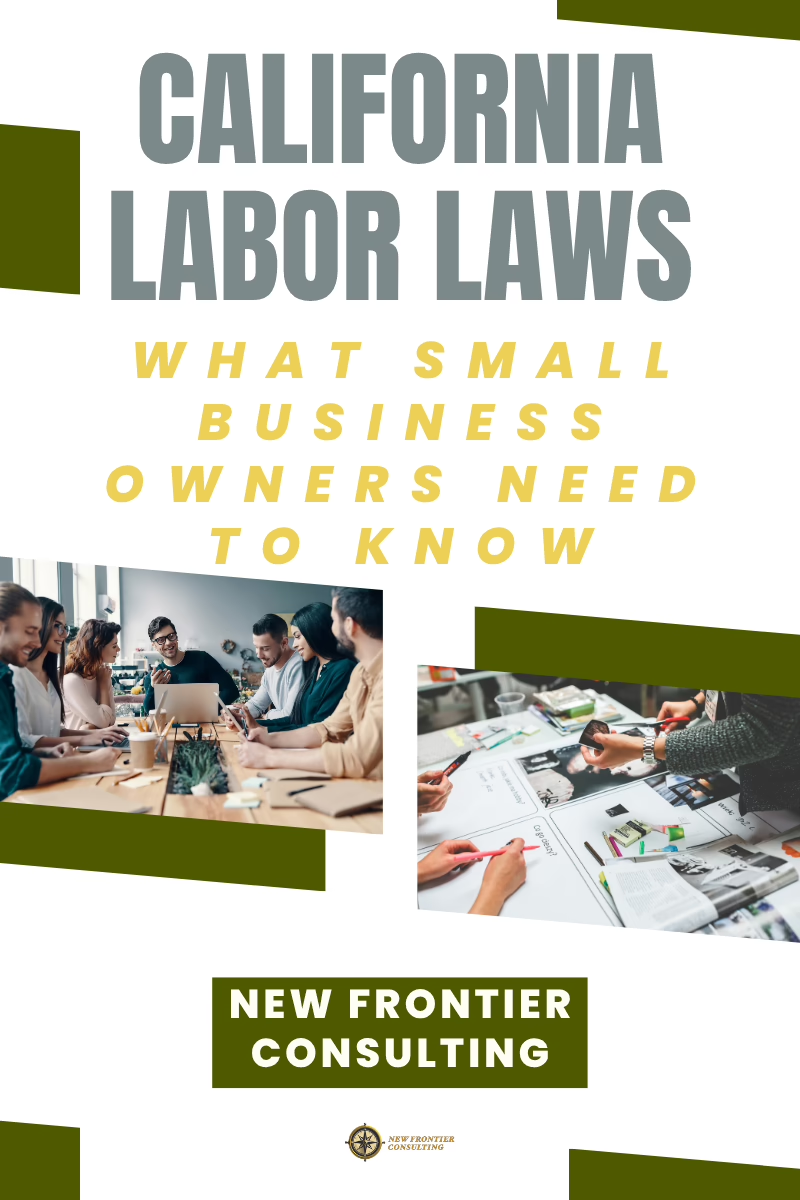We serve businesses in several different states. California labor laws are some of the most complex in the country. In addition to that, they’re constantly changing. If you’re a small business owner in the Golden State, staying compliant isn’t optional.
It’s essential to protecting your business and your people. The reality is that many employers don’t know what they don’t know, and it is setting their business up for failure.
In this post, we’ll walk you through the most important aspects of California labor laws, highlighting where small businesses often slip up, and show you how to stay compliant.

Why California Labor Laws are So Unique
California doesn’t just follow federal labor laws—it layers on more. California employers often have to know how to balance federal, state, and location specific HR laws.
This includes:
-
Stricter wage and hour rules
-
Expanded employee protections
-
More frequent reporting requirements
-
Steeper penalties for non-compliance
- OSHA regulations
- Training requirements
- And more
For example, California has its own rules for:
-
Minimum wage
-
Overtime
-
Break periods
-
Paid sick leave
-
Employee classification (W-2 vs 1099)
-
Anti-harassment training
That’s just to name a few!
If you’re not following current California labor laws, you could face fines, audits, or lawsuits, even with only a few employees.
Key California Labor Laws in 2025
Here are the most critical updates and ongoing requirements small employers must follow this year:
1. Minimum Wage
-
Statewide: $16.50/hour
-
Fast food workers (large chains): $20.00/hour
-
Health care workers: Up to $25.00/hour, depending on the facility
Note: Some cities and counties have higher local minimum wages. Always follow the stricter rate.
2. Meal and Rest Breaks
-
Employees must receive a 30-minute unpaid meal break for every 5 hours worked
-
10-minute paid rest breaks for every 4 hours worked
-
If these breaks are not duty free, you owe your employees additional compensation and may face fines
Note: Skipping breaks or requiring employees to work during them is one of the most common California labor law violations.
3. Paid Sick Leave
As of 2024, California expanded its paid sick leave law:
-
Employees accrue 1 hour for every 30 hours worked
-
Employers must provide at least 5 days (40 hours) per year
-
Accrual can carry over (up to 10 days unless capped)
Note: Ensure your handbook and PTO tracking reflect the updated requirements.
4. Harassment Prevention Training
-
All businesses with 5+ employees must provide sexual harassment prevention training
-
Supervisors: 2 hours, Non-supervisors: 1 hour
-
Must be completed within 6 months of hire and every 2 years thereafter
Note: This is not optional, and it must be documented!
5. Employee Classification
Under AB 5 and the “ABC Test,” many independent contractors must now be classified as employees.
Ask:
-
Does the person control their own schedule and methods?
-
Are they doing work outside your usual business operations?
-
Are they independently established?
Note: If the business cannot prove these requirements they’re likely an employee under California labor laws. This means businesses will owe payroll taxes, workers’ comp, and benefits.
Where Small Businesses Get It Wrong
Even well-meaning employers make mistakes. Common missteps include:
-
Misclassifying employees
-
Missing required break periods
-
Ignoring local minimum wage updates
-
Failing to provide enough sick leave
-
Using outdated handbooks
-
Forgetting to train new hires on harassment policies
California labor laws don’t leave wiggle room, and assuming “it won’t matter” is a dangerous gamble.
Neither will the state will not accept “I didn’t know” as a valid answer.
How to Stay Compliant (and Sane)
You don’t have to memorize the Labor Code.
But you do need an HR system that tracks the rules and keeps you in the clear.
To stay compliant in California:
-
Review your employee handbook annually
-
Audit payroll and timekeeping systems
-
Track PTO and break compliance
-
Keep required posters updated
-
Document all policies and training
-
Ask for help before making HR decisions
When in doubt, lean on professionals who understand the complexity of California labor laws and how they impact growing teams.
Less Confusion. More Compliance.
You didn’t start your business to become a labor law expert. But that doesn’t mean you can afford to ignore the rules.
We help small businesses build HR systems that:
-
Stay compliant
-
Protect against costly mistakes
-
Give you peace of mind as you scale
Book a free consultation today and let us help you navigate California labor laws.
Contact Us
Have questions? Give us a call: 661-750-2183.
